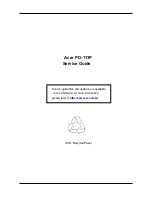46
The Setup Button
f
LEAD to REV
Sets the amount of lead level sent into the Re-
verb block. This and the remaining send and Lead
Level parameters are not stored as part of the
styles.
f
HARM to REV
Sets the amount of harmony level sent into the
Reverb block. Harmonies must be on to feed this
send.
f
DEL to REV
This allows you to feed the reverb block with the
effected output of the delay block. The DELAY
effect button must be on to feed this send.
f
LEAD LEVEL
Controls the lead (dry + Tone) voice level when
the individual effect is turned on with its respec-
tive footswitch. This allows a unique wet/dry mix
for individual effects. When multiple effects are
active, the lowest LEAD LEVEL value will deter
-
mine the value.
Note that the LEAD EFFECT SENDS parameter
on the PRESET tab must be set to PRE in order
for any signal to get to the effect block when
LEAD LEVEL is set to OFF.
introduce more discrete echo-like motion to the
tail where high values (0 to 25) make the tail
smoother-sounding.
f
PRE DLY
Pre Delay introduces a short (up to 100 ms)
delay between the dry audio signal and the onset
of reverb to help simulate larger spaces and to
provide audio separation between the dry signal
and the reverb effect.
f
SPEED
This controls the rate of pitch modulation set
by the DEPTH parameter. This modulation adds
complexity and slight chorusing between the
reverb tail and the input voice. The values range
from -25 to 25.
f
DEPTH
This controls the amount of pitch modulation
applied to the reverb tail. The values range from
-25 to 25.
f
DUCKING AMOUNT
This sets how much attenuation (gain reduc
-
tion) is applied to the reverb signal when a vocal
is present. For ducking to not be too obvious, a
slight reduction of -6 is best. The DUCKING
parameter must be set to ON for this to have
any effect.
f
DUCKING TIME
Ducking time sets how long it takes to ramp up
the reverb level at the end of vocal phrases.
Summary of Contents for voicelive rack
Page 1: ...USER S MANUAL v1 0 ...
Page 89: ......


















